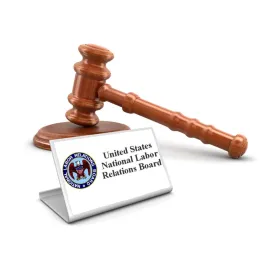Most people assume companies have certain fundamental rights, such as whether to continue operating their business in the face of challenging circumstances. Some may be surprised to learn that, on occasion, employers have been forced by the National Labor Relations Board (NLRB) to restart shuttered operations. That is exactly what happened a truck repair shop in March 2020 when the NLRB ordered the company to reopen after finding the employer had committed unfair labor practices. The employer appealed to the D.C. Circuit Court, which just recently released its ruling ordering the NLRB to reconsider its previous decision.
The court’s ruling stems from a labor dispute in which the owner of a truck repair shop, who also owned a concrete business, closed the shop allegedly in response to two mechanics expressing interest in forming a union. The NLRB found that the repair shop was a “single employer” with the concrete company, and that the employer shut down the repair shop in response to unionization efforts at the shop and to deter the concrete company employees from forming a union. As a result, the NLRB imposed the drastic penalty of ordering the employer to reopen the repair shop, rehire the employees, and bargain with the union.
Upon review, the D.C. Circuit Court ruled that the NLRB must reconsider its previous order because it failed to weigh whether the order was “legally permissible, feasible, necessary, or unduly burdensome.” The court further explained that the Board failed to cite any legal authority that allows it to compel a company to reopen an operation that no longer exists due to “loss of lease and for which there is no adequate space to house the operation within the existing company facilities.” On remand, the NLRB must reevaluate whether the employer shuttered the repair shop to chill union activity, despite evidence the company closed because its lease had expired. The Board must also explain what legal power it has to order restoration in this circumstance where the company does not have adequate space to reopen.
Normally, an employer is free to close its operations, even when facing unionization efforts. The Board, however, found a reopening order was warranted here because it found the employer closed the shop to deter union activity at the employer’s other concrete business. The D.C. Circuit’s ruling calls into question the Board’s authority to award such an extreme remedy, and highlights some of the limits on the NLRB’s remedial power. Whatever the Board’s ultimate decision on remand, employers should be aware of the heightened potential consequences at play whenever employees express interest in forming a union.




 />i
/>i